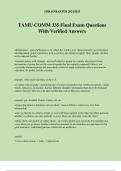©BRAINBARTER 2024/2025
TAMU COMM 335 Final Exam Questions
With Verified Answers
Globalization - answer✔the process by which the world is now characterized by an interrelated,
interdependent, global community with a seamless movement of capital, labor, people, and data
across national borders
dominant culture with example - answer✔collective people in a society who possess those
instruments of power that set the societal agenda that the majority commonly follows; not
necessarily numerical power but more about control of major institutions such as government,
education, the media, and the economy
example: white male Christians in the U.S.
co-culture with example - answer✔groups of social communities that exhibit perceptions, values,
beliefs, behaviors, or practices that are different enough to distinguish them from the dominant
culture; however there can a be dual membership such as Mexican-American
example: gay, disabled, female, Latino, old, etc.
relationship between dominant and co-culture - answer✔there is controversy over their
relationship!
some say that the co-cultures simply co-exist with none superior to the other but others question
whether co-cultures can truly mutually co-exist. Does one ultimately usurp the other?
culture shock and models of culture shock - answer✔a mental state caused by the transition that
occur when you go from a familiar cultural environment to an unfamiliar one and discover that
your normative, established patterns of behavior are ineffective
models:
U-curve (honeymoon -> crisis -> adjustment)
, ©BRAINBARTER 2024/2025
W-curve (honeymoon -> crisis -> recovery -> adjustment -> honeymoon at home -> crisis at
home -> recovery at home -> adjustment at home)
how to guard against culture shock - answer✔- learn about the language
- guard against ethnocentrism
- learn about the host culture
- work to maintain your own culture
ethnocentrism - answer✔(in class) judging other cultures using your own culture's standards
(in textbook) a conviction that one's own culture is superior to all other cultures
how do you balance/why is it necessary to balance generalizing with individual uniqueness?
What guidelines can help with this? - answer✔necessary because every individual is shaped by a
multitude of sources and culture is only one of them.
to avoid generalizing:
- cultural generalizations must be viewed as approximations not absolutes
- when you generalize, it should deal with primary values and behaviors of that particular culture
- try to use generalizations that can be supported from a variety of sources
- conclusions and statements about cultures should be qualified an tentative, never absolutes
(usually, often, sometimes, etc.)
definition of culture - answer✔many different definitions
- the human made part of the environment
- a set of human made objective and subjective elements that in the past have increased the
probability of survival and resulted in satisfaction for the participants in an ecological niche and
thus became shared
- the totality of that group's thoughts, experiences, and patterns of behavior and its concepts,
values, and assumptions about life that guide behavior and how those evolve with contact with
other cultures
-culture's function is to essentially make life
unproblematic for people by "teaching" them how to adapt to their surroundings
, ©BRAINBARTER 2024/2025
definition of communication - answer✔the dynamic process in which people attempt to share
their thoughts with other people through the use of symbols in particular settings; it is dynamic,
symbolic, contextual, learned, and has consequences
different models: linear, interactive, and transactional (with transactional being the best model
for it)
uses: identity, person perception, interpersonal needs, and persuasion
various components of communication - answer✔- source
- encoding
- messages
- channel (means by which the message is sent like phone, by mouth, email, etc.)
- receiver
- decoding
- feedback (response to message)
- noise (can be environmental, psychological, or semantic)
elements of culture and how do they represent that culture is systemic? - answer✔Elements
- religion
- history
- values
- societal organizations
- language
systemic because culture is integrated where all the elements are interconnected and influence
each other; for example, values regarding materialism can stem from a variety of sources
(history, family, or religion) and can influence things such as family size, work ethic, use of
time, and spiritual pursuits
deep structures and why they are important - answer✔- conscious and unconscious assumptions
about how the world works




